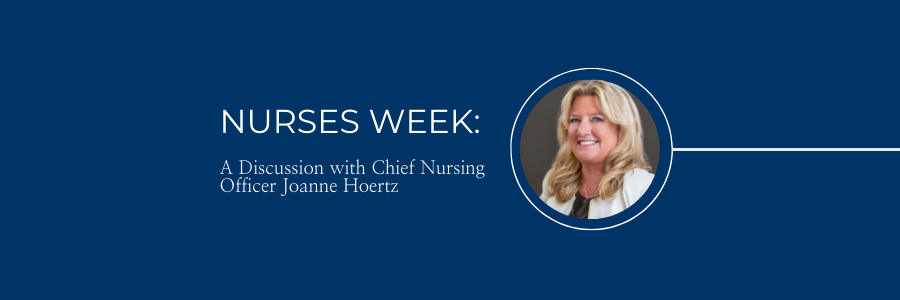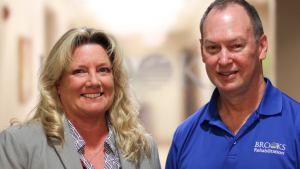Nurses Week: A Discussion with Chief Nursing Officer Joanne Hoertz

Back to physical health resource hub
National Nurses Week runs each year from May 6 to May 12 (Florence Nightingale’s birthday.) As Brooks Rehabilitation continues to celebrate the second half of the week, we talked with Joanne Hoertz, RN, MSN, CRRN, Senior Vice President for Nursing and System Chief Nursing Officer. Ms. Hoertz has been a nurse for more than 30 years, the majority in rehabilitation nursing and leadership roles. She has been with Brooks since 2008.
Q: What made you choose nursing as a profession?
I’ve been a nurse for about 33 years. I identified early on that nursing was the direction I wanted to go. My mother is a nurse. I was able to see that there were many opportunities for nurses in the workforce. I saw it as a way to make a difference for both patients and the community overall.
Q: Why rehabilitation nursing?
I originally started my career path in trauma nursing, and I was progressing in a managerial administrative and leadership track. There was an opportunity for a manager position on the rehabilitation unit. I saw how I could apply nursing leadership principles – even something as simple as inclusion of individual people in decision-making – to make a big difference in workflow for the staff. So, I took the rehab nurse manager position, and I discovered how wonderful rehabilitation nursing was.
Q: What are some of the differences with rehabilitation nursing?
In the rehabilitation setting, there is an opportunity to be part of a true interdisciplinary team. We take a bio-psychosocial approach to care and assessment of an individual with a physical or cognitive disability. You look at the whole patient overall and everything that’s contributing to their state of wellness. With catastrophic injuries or chronic illnesses, it’s just not the effect on an individual person – it impacts the whole family. So, the rehabilitation nurse needs to be proficient in many areas. Besides direct nursing interventions, they’re an educator, they’re an advocate, they’re a counselor. You help individuals and families adapt to whatever their new life is, and to reintegrate them back into the community. That’s something that’s very tangible and you can see the difference that makes in the lives of the patients and their families.
Q: You have the Certified Rehabilitation Registered Nurse (CRRN) credential, as do many Brooks nurses. What does that mean for the nurses, Brooks and its patients?
Rehabilitation nursing is a specialty practice, and in order to have the highest level of knowledge and be able to implement the best evidence-based nursing interventions to your clients, you really need to have extra training. This specialty certification is a sign to your patients, residents, the rest of your staff, that you have specialized knowledge and experience. In addition to specific pathophysiology around an injury or impairment, a CRRN has training in ethics; in advocacy; in the legislative policies that impact individuals with disabilities; accessibility; improving quality life; and improving levels of independence. Obtaining CRRN certification is a challenging, but worthwhile, process.
Q: In 2016, Brooks Rehabilitation Hospital received official Magnet recognition from the American Nurses Credentialing Center’s (ANCC) Magnet Recognition Program® and is currently undergoing re-accreditation. What does that mean to you?
Magnet is recognized as the gold standard of nursing excellence. This is a reflection of our nursing professionalism, teamwork, and superiority in patient care. Brooks was the first in Florida, and one of only five freestanding inpatient rehabilitation facilities in the country, to achieve this designation.
It takes a lot of time and a lot of structure to create a Magnet culture, and you have to put in a lot of work to sustain it. So, it’s something that we’re proud of and committed to continuing.
You go through a redesignation process every five years. We just completed our appraisal site visit and have submitted a large amount of documentation to show how we’re still meeting all of the components of the Magnet model.
Q: How did the pandemic affect your redesignation efforts?
It did distract, but the underlying structures and measurements of the Magnet model are always in place. For the pandemic it was all hands-on-deck, so we didn’t do as much research or continuing education as we would have wanted to. But on the flip side, we actually had two different sessions with Magnet representatives where we presented how we responded to the community need that our acute care partners had for placement of COVID positive patients. It was the Magnet components in action – how do we provide enough training, education, and safety so that we could take COVID positive patients? How do you get the staff involved in decision-making? How do you make sure that you’re meeting the needs of the staff? They were really very impressed by our COVID response.
Q: It’s been a tough 15 months for all of us. What would you say about your staff and how they performed?
They’ve been exceptional. The core nursing team and the staff have really gone above and beyond to meet the needs of our patients and families – and even each other as staff members. It’s a highly dedicated group who are very giving and very focused. I saw exceptional teamwork and an exceptional response to this crisis. People were resilient. They came to work, day in and day out, despite whatever was happening, maintaining a positive and professional outlook. The entire team should be commended.


